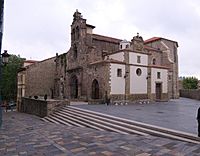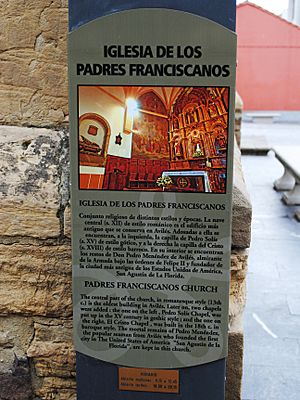San Antonio de Padua, Avilés facts for kids
Quick facts for kids San Antonio de Padua Church (Avilés) |
|
|---|---|
| San Antonio de Padua (Padres Franciscanos) | |
 |
|
| 43°33′26.5″N 5°55′16.2″W / 43.557361°N 5.921167°W | |
| Location | Asturias, |
| Country | Spain |
| History | |
| Founded | 12th-13th centuries |
The San Antonio de Padua Church is a very old and important building in Avilés, a town in Asturias, Spain. It's also known as the Church of the Franciscan Fathers. This church is built in the Romanesque style, which was popular a long time ago. It's special because it's the oldest building still standing in Avilés!
For many years, from 1919 until 2013, Franciscan monks lived in and took care of this church. They are a group of religious people who follow the teachings of Saint Francis of Assisi.
Contents
History of the Church
The San Antonio de Padua Church was built a very long time ago, between the 12th and 13th centuries. This means it's over 800 years old! Imagine all the history it has seen.
The Franciscan Monks
The Franciscan monks played a big role in the church's history. They are known for living simple lives and helping others. Their presence in the church for nearly a century made it a significant place for their order in Avilés.
Pedro Menéndez de Avilés
Inside the San Antonio de Padua Church, you can find the tomb of a very famous person named Pedro Menéndez de Avilés. He was an important Spanish explorer and admiral.
Founder of St. Augustine
Pedro Menéndez de Avilés is especially famous for founding the city of St. Augustine, Florida in the United States. He established this city in 1565, making it the oldest continuously inhabited European-established settlement in the United States. It's pretty cool that his final resting place is in this historic church in his hometown of Avilés.
Romanesque Architecture
The church's Romanesque style is easy to spot. This style was common in Europe from the 6th to the 13th century.
Key Features
Romanesque buildings often have thick walls, round arches, sturdy pillars, and large towers. They were built to be strong and last a long time, which is why the San Antonio de Padua Church is still standing today!
See also
 In Spanish: Iglesia de los Padres Franciscanos para niños
In Spanish: Iglesia de los Padres Franciscanos para niños



